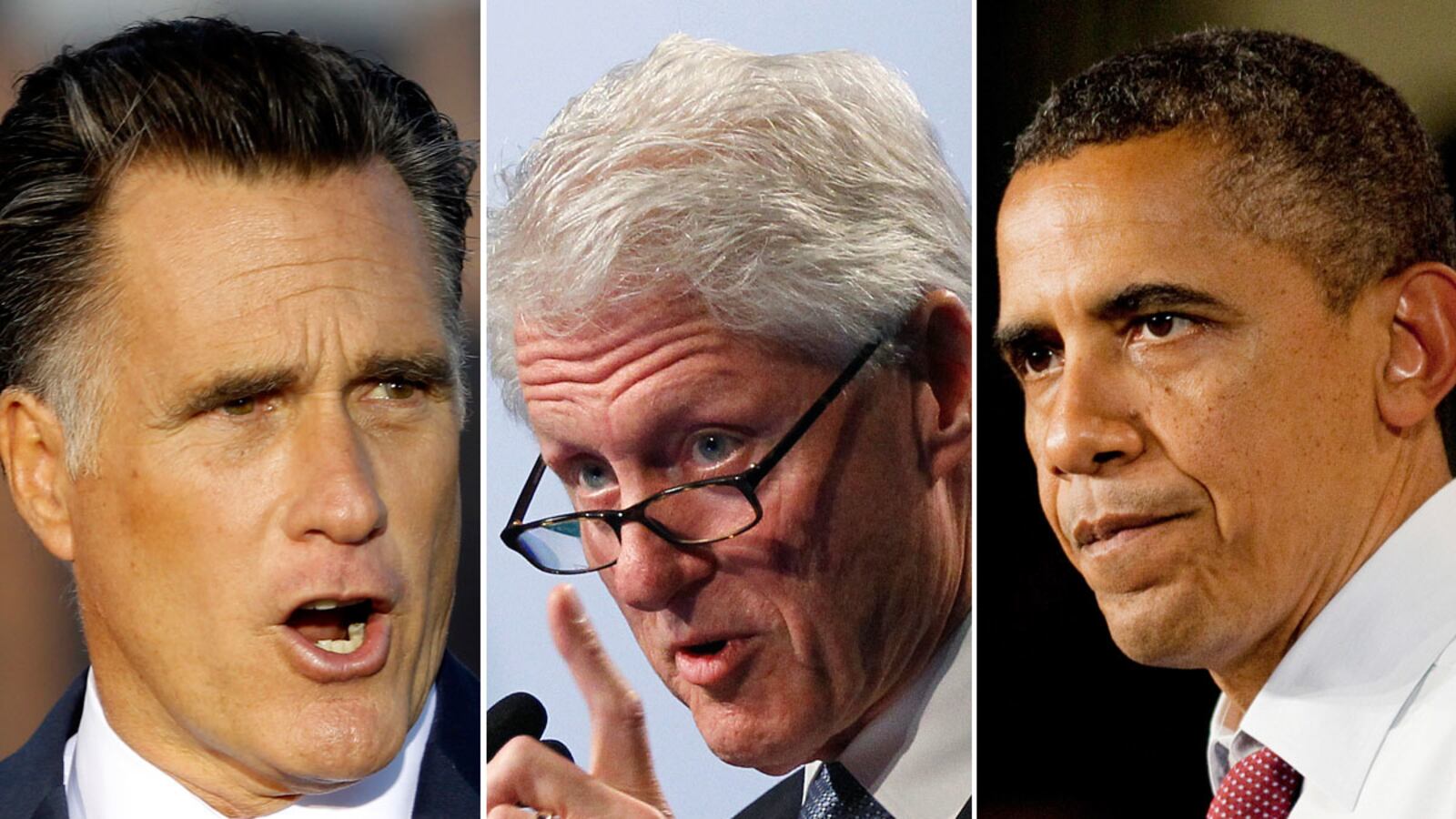Politicians come and go but Bill Clinton is forever, or so it seems with the former president slated for a starring role at the Democratic convention next month.

His legacy is getting top billing in both the Obama and Romney campaigns. President Obama is running as the rightful heir to Clinton’s economic approach in the robust way that Al Gore should have but didn’t, and Romney is praising Clinton for being a “new Democrat” while saying Obama is stuck in the past with old-style liberalism.
Strangely enough, Clinton has become a touchstone for both candidates, along with the policies that helped produce a budget surplus and 24 million jobs. “What people remember most about Clinton—it’s not Monica, it’s economic growth,” says Jack Pitney, professor of American government at Claremont McKenna College. Clinton’s appearance at the Charlotte convention in a slot normally reserved for the president’s running mate will have a “multiplier effect” that will reinforce Obama’s policies and “make it clear the choice the voters have,” says deputy White House press secretary Josh Earnest.
When Romney invokes Clinton, it helps with independent voters who have fond memories of the 1990s, says Pitney. “A lot of the high-decibel animosity toward Clinton has faded. Clinton is yesterday’s enemy.”
In a new ad that is a highlight reel of Romney’s business career and his success with the 2002 Olympics, Clinton’s remark of some weeks ago—saying Romney had a “sterling business career”—remains on the screen throughout. Romney is trying to appeal to white working-class Democrats skeptical of Obama who voted for Hillary Clinton in the primaries. “Obama uses Clinton as a magnet, and Romney uses him as a wedge,” says Republican pollster Ed Goeas.
What, exactly, is “Clintonomics”? The central tenet of Clinton’s economic policy is progressive taxation. He had campaigned on a big middle-class tax cut, but once elected and confronted with the numbers, realized he couldn’t do it and moved toward deficit reduction instead. He raised tax rates in his first budget as president, which passed with no Republican votes and with Vice President Gore breaking the tie in the Senate.
Clintonomics is a “straight-to-the-heart rejection of Reagan trickle-down economics,” says Jared Bernstein, a former Biden adviser now with the Center on Budget and Policy Priorities.
Obama is campaigning on a restoration of the Clinton-era tax rates in asking a bit more from people at the upper end of the income scale. “The last time I can remember a sensible, smart, forward-looking tax policy was the early years of the Clinton administration, and that’s a lot of years ago now,” says Bernstein. Romney, by contrast, is calling for more tax cuts, Republican gospel since the early ’80s and the Reagan presidency. “One recognizes the folly of supply side; the other wants to double down on supply side.”
Obama echoes Clinton when he says if you play by the rules you should get a fair shake. Both believe in critical investments in education, energy, and infrastructure. (Remember 100,000 cops on the street? And that the engine of the economy is the middle class? Obama has been praising the Clinton approach so frequently on the campaign trail that a reporter recently asked White House press secretary Jay Carney, “Is he running on the Clinton economy or the Obama economy?”)
One area where Romney is closer to Clintonomics is the wave of deregulation that Clinton ushered in. He and his economic team encouraged repeal of the Glass-Steagall Act, which opened the door for banks to engage in risky investments. Wall Street loved Clinton. “Wall Street money is aggressively non-partisan, it flows to where the biggest return is,” says Dennis Kelleher with Better Markets, a financial watchdog group. “Almost everybody in that administration cycled through the financial industry.”
Obama took office in the midst of a financial meltdown caused in large part by the excesses of Wall Street, and the regulations he signed into law with the Dodd-Frank legislation have cost him much of the support from the business community that Clinton had enjoyed. Delaware Gov. Jack Markell, a Democrat who heads the National Governors Association, says Obama doesn’t deserve the bad rap he gets from business leaders. Obama has done things that are “very Clintonian” and “against the grain of the party” in trade deals and export promotion, Markell says. “Not everybody is crazy about the trade stuff. That’s not old-time liberalism at all.”
Clinton benefited enormously from an economic boom, sparked in part by the growth of the Internet. No wonder both candidates want to identify with a president who is a reminder of better times, with the hope that some of that magic will rub off on them.






